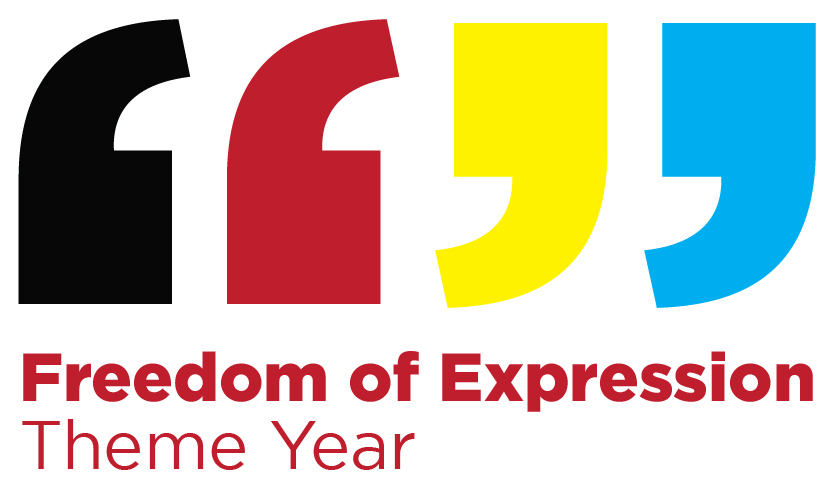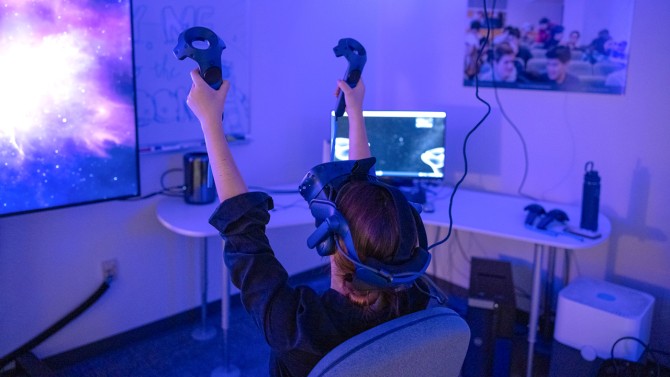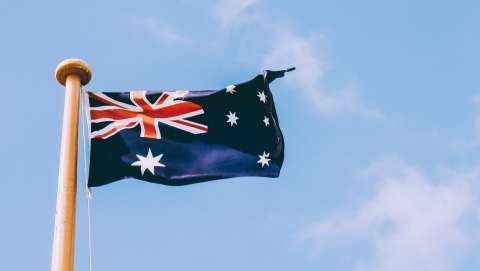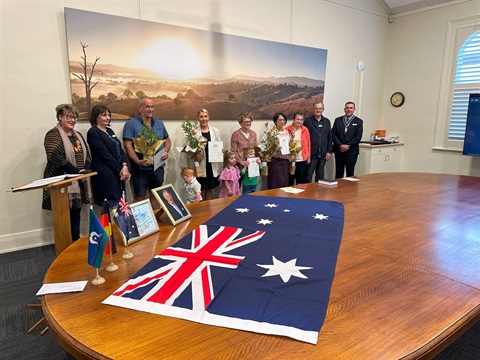Multimedia artist Laurie Anderson took a captivated Cornell audience on a trip through the arc of her career during a Sept. 26 talk at the Schwartz Center for the Performing Arts.
The talk was recorded and is now available to view on eCornell.
Part of the College of Arts and Sciences’ Arts Unplugged series, Anderson’s conversation with music Professor Judith Peraino ranged from her sculptures and paintings to musical instrument inventions to her latest forays into virtual reality and artificial intelligence and a work-in-progress opera about the end of the world.
Anderson spoke with fondness of her early painting teachers, who taught her it’s OK to break the rules and to find your own form of expression.
“One of my teachers told me that when you’re really stuck, try to do your worst work and I think you’ll find that it could become your best work, because you don’t have all of those rules,” she said. “I’m grateful to people who say it doesn’t matter so much. The important thing is to feel free.”
A Cornell student takes a trip through space in Anderson’s “To The Moon” virtual reality experience, which is on campus through Oct. 6 at the Center for Teaching Innovation.
“Anderson’s work embodies a boundless freedom of thought, and the conversation brought that out,” said Peraino, the faculty host for Anderson’s visit. “It’s inspirational to hear an artist of such range speak with humor and candor about her creative process and the challenges of being an artist in the current moment.”
The Milstein Program in Technology & Humanity was the lead sponsor for Anderson’s two-day visit, which was part of the university’s theme year, “The Indispensable Condition: Freedom of Expression at Cornell.”
Along with Anderson’s visit, which included a workshop with students, Cornell Cinema showed three of her films in September and Cornell’s Center for Teaching Innovation hosted “To The Moon,” a virtual reality experience created by Anderson and Hsin-Chien Huang. That VR exhibit continues until Oct. 6 and students can sign up at this link.
“To The Moon’ is eerie, elegant, and maybe the most poetic use of VR I’ve ever experienced,” said Austin Bunn, associate professor of performing and media arts, director of the Milstein Program and another faculty member planning Anderson’s visit. “In the world of commercial VR, led by Meta and soon Apple, I’m thrilled that Cornell students have an opportunity to see such alternative, artistic visions of our virtual futures.”
Anderson’s varied creative career has ranged across poetry, prose, music, dance, film, drawings, paintings, sculptures and multiple varieties of digital works.
During her Schwartz Center event, Anderson and Peraino talked about Anderson’s wooden “handphone” table, created with depressions for a person’s elbows and a hidden sound system inside so that only a person sitting at the table with their hands over the ears can hear what’s going on inside. They shared video clips of Anderson’s explorations with vocal filters, including the creation of her character Fenway Bergamot, her male alter ego, and of her more famous musical pieces, including “O Superman.”
Anderson also shared some of her altered violins – “I think of the violin as a surrogate, it is a ventriloquist dummy character that you can make talk,” she said. “It’s lonely to be a solo performer, so this is a way to have a conversation.”
Her new opera, “Ark,” is the story of a 21st century ark being created to prepare for the end of the world. It’s based on the story of an American religious sect that, through calculations of tides and winds and currents, determined that the Garden of Eden of biblical stories was actually in upstate New York. “Through a series of rather specious time/space calculations, they’ve concluded that the ark has not left yet,” Anderson said. “So I said, ‘that’s the story I wanted to write.’ “
“It’s about where you think you’re going and when and what you are going to take,” Anderson said.
To close her talk, Anderson told the audience about a project at the Australian Institute for Machine that has taken all of her work – every song, speech, poem, video, book, interview, everything she’s ever said – and uses AI to create an Anderson-style poem based on a few words users type in.
“They crossed my work with the bible and they sent me a 9,000-page text, ‘The Bible According to Me’,” she said. “It was terrifying. I’m telling you with great confidence about the creation of the world, the dominion of man over animals, the fiery end in Revelations. It’s freakish.”
The institute also included the work of Anderson’s late husband, Lou Reed, and so “now we write together,” she said. “‘I’ll Be Your Mirror,’ (part of her Stockholm show) was part of this experiment in songwriting in these two voices through AI.”
To demonstrate the poetry AI, Anderson took a suggestion from the audience: “The cathedral sipped on muscle milk.” It generated an Anderson-style poem that ends this way:
Yeah it’s that time of year again
The season when everything seems to have gone
Bad or better or worse than it did before
And just as I’m about to ask what’s next
What’s next, the answer is: nothing
Just as I said
Don’t think of it as dead
This is just a muscle memory
Kathy Hovis is a writer for the College of Arts and Sciences.










